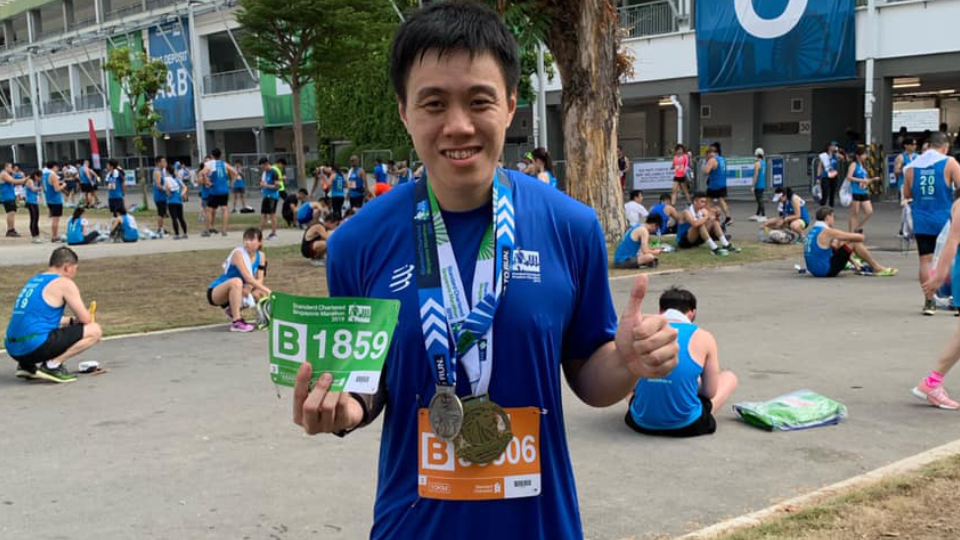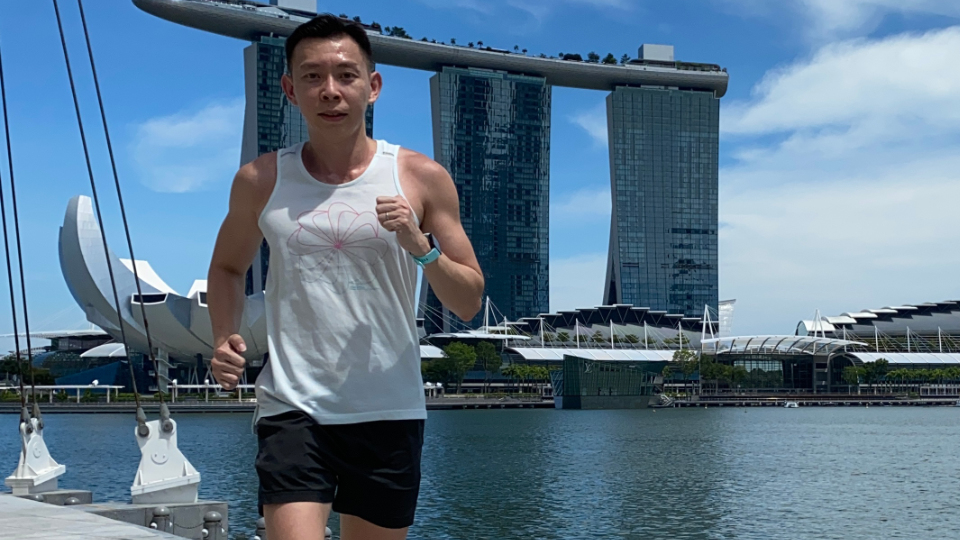If you are running without a plan, you are most likely to skip your running session, for both work and life commitments make it difficult to plan and execute a consistent training plan.
To conquer the half marathon or a full marathon, developing consistent running practises is an essential piece of in your process. But the thing is, how do we run in a consistent running practice?
We spoke to three avid runners who shared their running routine and how they develop a consistent running practises to improve their race.
1. Ng Chan Yiap
Bio: Singaporean, 30 year-old, RPA Automation engineer

Ng was interested in long distance running back in 2011, after he completed his first full Singapore marathon in 7:30h with zero training. Since then, he has kept participating in Singapore running races and participated in his first overseas marathon race in 2016.
From then on, he continued to train and enjoy the joy of completing races, even up till today, and it has already been 10 years since he started his long-distance running journey.
RS: How does running affect your fitness training?
Chan Yiap: Running can improve my cardiovascular endurance, stamina and helps give my body a sense of satisfaction after the run; and it also improves my heart health.
RS: How long have you been training to run?
Chan Yiap: I have been training for the past 10 years since I started running in 2011. Running is something that I like to do; therefore, I am able to run and train consistently without feeling bored.
RS: What kind of preparation do you go through in order to develop a consistent running practise?
Chan Yiap: I always aim to do three runs per week, two short runs and one long run. I will plan ahead my workout schedule ahead like my gym days, and running days. It will be easier for me and allows me to skip making decision on whether I should run or go to the gym.
RS: What are your short-term and long-term goals in running?
Chan Yiap: My short-term goal is to be able to keep on running to maintain my fitness, even though there are no local races in Singapore due to COVID-19. I am hoping to come back stronger than before when the local races in Singapore resume. My long-term goal will be to keep fit even until I hit 60 and above.
RS: What advice would you give to all runners to enjoy the process even if it’s tough?
Chan Yiap: Pace yourself and train for a race. Running does not need to be fast if you are not able to. Run at your own pace, and eventually, you will improve over time.
I know running aimlessly without a goal can be quite boring, or you cannot see any good results after running so much. To get the motivation to run, try to sign up for races because as the racing day gets closer, you will tend to set a goal for yourself on what timing you wish to achieve for that race day, but be realistic with your goal, and not a goal that is impossible to achieve.
You can follow Chan Yiap on Instagram: @marathon_chan_yiap
2. Melissa Foo
Bio: Singaporean, 34 year-old, Customer Relations Manager

Melissa has started running leisurely since 2015 in a bid to lose weight and become fitter but got hooked on running and training for marathons after doing her first Standard Chartered Marathon in 2016.
She had no idea how to train properly until she joined a running group with Superhero Runners in 2018 and met many like-minded friends, who both motivated her and gave her advice on how to run better. Since then, she has done five full marathons and one 50km ultramarathon.
RS: How does running affect your fitness training?
Melissa: Running has become part of my fitness routine, and I try to put in at least 4 hours of running a week over 3 to 4 days. The long run can be quite time-consuming, so I usually start as early as 6:30 a.m. on weekends, which frees up my time for other appointments later in the day. I also go to the gym regularly, and I try to do a workout before running to save time as well.
RS: How long have you been training to run?
Melissa: I’ve been running leisurely since 2015 but only really started training properly after 2018 when I joined Superhero Runners on Tuesday evenings and learnt how to vary my workouts as well as met friends with whom I run regularly on our own.
I usually centre my training around races (one full marathon a year, usually in December with Standard Chartered Marathon) and some half marathons in April, like the 2XU Compression Run, and aim to improve my PB (Personal Best) each time.
RS: What kind of preparation do you go through in order to develop consistent running practise?
Melissa: Once I’ve set a target (usually a race), I will come up with a training plan together with my running friends that will slowly build up our mileage and improve our speed towards the race day. I think having a goal or target time to complete the race really helps us to focus, and setting a routine and running together gives us that extra discipline to stick to our training plans.
Sometimes, joining different running groups helps to set this routine as well. For example, I run with Superheroes on Tuesdays for our easy or recovery runs and hill repeats at Mt Faber with X-trailblazers on Thursdays. I also try to arrange a weekend morning run with my friends for our long distance runs, especially when we need to build our mileage towards race day.
RS: What are your short-term and long-term goals in running?
Melissa: My short term goals are just simply to improve my PB for both my half marathons and full marathons each year. My long term goal would be to qualify to run in the Boston Marathon, and of course, continue to run injury free throughout my life, even when I’m 80 because I just love running!
RS: What advice would you give to all runners to enjoy the process even if it’s tough?
Melissa: It’s really hard when you hit the wall or push your limits during interval training but well worth it when you see your timings improve. And, of course, there’s a sense of fulfilment when you’ve completed your goal.
My advice would be to set small goals and tell yourself to take it just a little further each time (be it run another kilometre or just push another set of intervals) and see how you feel after you have done it. That’s how I started from just being able to run 2km to 50km in one run, and I think I’m now ready for more.
You can follow Melissa on Instagram: @swashed
3. Ivan Chan
Bio: Singaporean, 46 year-old, Head, Office of Student Care

Ivan has been actively running for 6 years since 2015. It was a good decision, made to change his former sedentary lifestyle for himself and his family.
He believes that he needs to be healthy and fit so that he can look after his family well. He has grown from an amateur runner to an active participant in local races, such as the Singapore Chartered Singapore Marathon, Income Eco Run and Spartan Race.
With the prevailing COVID-19 situation, although the races are cancelled, he continues to run on his own or with running buddies to maintain his fitness. He also takes part in virtual races, but this is nothing compared to physical races where the adrenaline drives us high.
RS: How does running affect your fitness training?
Ivan: My exercise regime in a typical week includes weight training and HIIT. Running is an important part of my fitness training that I will not miss, as it gives me the needed cardio to help improve my stamina when I do my HIIT.
Running is also very therapeutic to me, as I can just throw my stress and worries away when I run, and, just simply enjoy the scenery, watching people and listening to my own heartbeat and steps.
RS: How long have you been training to run?
Ivan: I started running in 2015 when I turned 40. Back then, I was very weak and often fell sick easily. Getting older and as a father of two, it struck me that I needed to change my lifestyle to build up my health to look after my family. My wife was already running actively then and a positive change in her health inspired me to take up running.
I started running in Park Connectors near my house and became more comfortable with running. I took part in my first ever 10km race in 2015 with my wife, and the rest is history. I began to participate in more races, and by the end of 2015, I attempted my first marathon. It was painful but a great achievement for me!
RS: What kind of preparation do you go through in order to develop consistent running practise?
Ivan: I include running as part of my routine in a week and plan my schedule around it. Weekdays can be a challenge for me to run due to heavy work and family commitments, but that does not stop me from planning my runs from Fridays to Sundays.
My running gear will always be in my car boot on Friday to go for a short 5km run after work. Saturdays and Sundays are for longer runs, in which I make time to complete my running goals for the week.
I will either run with my wife early in the morning while the kids are still sleeping, or I will plan my run between the waiting time when my kids go for their enrichment class. No time is wasted.
I strongly believe that once we break the consistency, it will be very hard to get back on track, and most people will choose to give up totally. Therefore, I disciplined myself that no matter how busy or tired I am, I will not forgo my fitness training and run sessions.
RS: What are your short-term and long-term goals in running?
Ivan: I have done two marathons, one in 2015 and the other in 2019. However, I was not adequately trained to take on the 42.195km challenge then, and it was a pretty painful experience to complete both the races.
Being an amateur runner in 2015, I completed the run under 7 hours in pain. In 2019, I completed the marathon in 5 hours, an improvement for me, but it could have been better if I were more well-trained to take on the distance. My short-term goal would be to better myself and complete my third marathon and challenge myself to finish the race in under 5 hours.
My long-term goal would be to continue and maintain my running habits so as to stay healthy and fit. I would not give trade this for anything else.
RS: What advice would you give to all runners to enjoy the process even if it’s tough?
Ivan: You can find a running buddy. I would include a running buddy, e.g., my wife, to run with me during the weekends. Having a partner or a group of friends helps to encourage one another during each run, especially if the terrain or distance is a killer on that day.
When a morning run is scheduled with a running buddy, you know your running partner is waiting for you, and you will not be tempted to skip that running session and sleep in instead.
Joining a running club helps, as it gives you the opportunity to meet like-minded people who like to run and learn running tips from one another. A running club is definitely a good way to expand our social circle as well.
You can also try to explore different running routes. Running the same route over and over again can be very boring and kills the enjoyment after a while; this is a no-brainer. I always run on different routes in Singapore, from Park Connectors in Punggol and Serangoon to Gardens by the Bay, Labrador Park, Mount Faber, MacRichie, Kallang and Fort Canning.
There are many more places to run in Singapore, and it excites me when I run a new route every time.
You can follow Ivan on Instagram: @dadtokeepfit
Building a consistent run is the secret sauce for you to run to the next level. If you found ways to run consistently, feel free to share your tips and trick with us. We would love to hear your thoughts.





